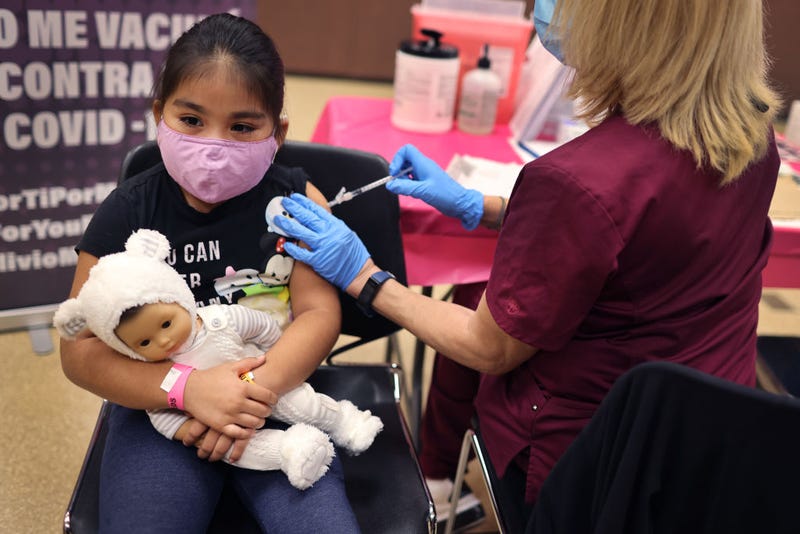
In the U.S., children ages 5 to 11 were able to get vaccinated for COVID-19 starting Nov. 2, and 10 percent of kids in the age group have already received their first shot.
White House Coronavirus Response Coordinator Jeffrey Zients said during a Wednesday press briefing that the country’s child vaccine program “hit full strength” 10 days prior. As of Wednesday, the pace of vaccination was accelerating.
“In the last week, 1.7 million kids got vaccinated — double the prior week,” said Zients. Vaccines for kids at more than 30,000 locations, up from 20,000 last week.
Zients said that means there is one vaccine site for every 900 children in the nation, compared to one vaccine site for every 3,500 Americans age 12 and older.
He said an estimated 2.6 million children have received their first dose of a Pfizer vaccine authorized for use in children. So far, the Pfizer vaccine for children – a lower dose of the company’s vaccine for adults – is the only COVID-19 vaccine authorized for use in children by the U.S. Food and Drug Administration.
“Our effective rollout is helping parents and families across the country experience the giant sigh of relief of knowing their kids are on the path to having protection from the virus,” said Zients.
Child vaccinations are happening at a faster rate than the initial adult vaccinations, he added. It took around 50 days for 10 percent of he U.S.
adult population to receive one COVID-19 vaccine dose.
Even the polio vaccine took longer to distribute. According to Zients, it took about three months to cross two and a half million shots in arms when the polio vaccine was first rolled out in the 1950s.
Overall, approximately 300,000 individuals receive their first COVID-19 vaccine shot. As of Wednesday, 80 percent of Americans 12 and older with at least one shot. Additionally, 31 million Americans have also had a booster shot, said Zients.
“We have 62 million Americans eligible for vaccines who are still not vaccinated,” said Director of the National Institute of Allergy and Infectious Diseases and the Chief Medical Advisor to the President Dr. Anthony Fauci during the press briefing. He encouraged everyone to get vaccinated and for those eligible to get booster shots.
“With new milestones like vaccines for kids ages 5 through 11, we’re seeing new waves of misinformation hitting the inboxes of parents and social media feeds across the country,” said U.S. Surgeon General Dr. Vivek Murthy. “This isn’t just something that affects a small segment of society. A recent poll indicated that nearly 80 percent of American adults either believe or aren’t sure about a common COVID-19 myth.”
Later this week, more data about child vaccinations is expected from the Centers for Disease Control and Prevention. Since the CDC collects data from states and other entities, there can be several-day delays.
CDC Director Dr. Rochelle Walensky said Wednesday that the centers “are actively following vaccine effectiveness in our adolescents, our ages 12 and up, where we have more data,” and that more information about vaccine effectiveness will be released later this week.
“In the meantime, we are actively also following data on our 5- to 11-year-olds,” she said. “Obviously, we need some time for them to get their first dose, get their second dose in order to follow those breakthrough cases, but we are actively collecting those data.”
However, even if children have just one dose of the vaccine, families will be better protected against the virus this holiday season, said The Washington Post.
“In addition to the benefit to the children themselves, their immunity will decrease community spread and help keep adults around them safer,” said Robert Wachter, the University of California at San Francisco’s medicine department chair, according to the outlet.
“Imagine a holiday gathering with older people and their grandchildren — if the kids are vaccinated, the chances that one of them will infect their elderly relative, sometimes with devastating effects, goes down significantly,” he added.


